Related Research Articles
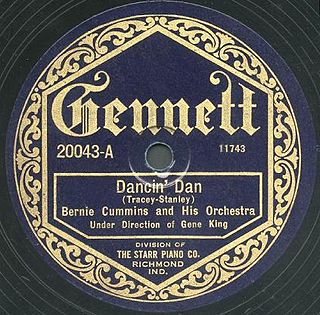
Gennett was an American record company and label in Richmond, Indiana, United States, which flourished in the 1920s. Gennett produced some of the earliest recordings by Louis Armstrong, King Oliver, Bix Beiderbecke, and Hoagy Carmichael. Its roster also included Jelly Roll Morton, Blind Lemon Jefferson, Charley Patton, and Gene Autry.
Congolese music is one of the most influential music forms of the African continent. Since the 1930s, Congolese musicians have had a huge impact on the African musical scene and elsewhere. Many contemporary genres of music, such as Kenyan Benga and Colombian Champeta, have been heavily influenced by Congolese music. In 2021, Congolese rumba joined other living traditions such as Jamaican reggae music and Cuban rumba on UNESCO's "intangible cultural heritage of humanity" list.

Paramount Records was an American record label known for its recordings of jazz and blues in the 1920s and early 1930s, including such artists as Ma Rainey, Tommy Johnson and Blind Lemon Jefferson.
Soukous is a genre of dance music from Congo-Kinshasa and Congo-Brazzaville. It derived from Congolese rumba in the 1960s, becoming known for its faster dance rhythms and bright, intricate guitar improvisation, and gained popularity in the 1980s in France. Although often used by journalists as a synonym for Congolese rumba, both the music and dance associated with soukous differ from more traditional rumba, especially in its higher tempo and longer dance sequences. Notable performers of the genre include Franco Luambo and his band TPOK Jazz, Papa Wemba, Sam Mangwana, Tabu Ley Rochereau, and Pépé Kallé.
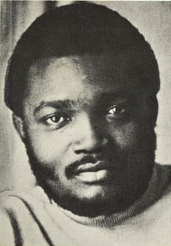
François Luambo Luanzo Makiadi was a Congolese musician. He was a major figure in 20th-century Congolese music, and African music in general, principally as the leader for over 30 years of TPOK Jazz, the most popular and significant African band of its time. He is referred to as Franco Luambo or simply Franco. Known for his mastery of African Rumba, he was nicknamed by fans and critics "Sorcerer of the Guitar" and the "Grand Maître of Zairean Music", as well as Franco de Mi Amor by female fans. His most known hit, "Mario", sold more than 200,000 copies and was certified gold.

Pascal-Emmanuel Sinamoyi Tabu, better known as Tabu Ley Rochereau, was a leading African rumba singer-songwriter from the Democratic Republic of the Congo. He was the leader of Orchestre Afrisa International, as well as one of Africa's most influential vocalists and prolific songwriters. Along with guitarist Dr Nico Kasanda, Tabu Ley pioneered soukous and internationalised his music by fusing elements of Congolese folk music with Cuban, Caribbean and Latin American rumba. He has been described as "the Congolese personality who, along with Mobutu, marked Africa's 20th century history." He was dubbed "the African Elvis" by the Los Angeles Times. After the fall of the Mobutu regime, Tabu Ley also pursued a political career. His musical career ran parallel to the other great Congolese rhumba bandleader and rival Franco Luambo Makiadi who ran the band TPOK Jazz throughout the 1960s, 1970s and '80s.

Joseph Athanase Tshamala Kabasele, popularly known as Le Grand Kallé, was a Congolese singer and bandleader, considered the father of modern Congolese music. He is best known for his role as leader of the band, Le Grand Kallé et l'African Jazz, in which capacity he was involved in a number of noted songs, including Indépendance Cha Cha.

Nicolas Kasanda wa Mikalay, popularly known as Docteur Nico, was a guitarist, composer and one of the pioneers of Congolese music. He was born in Mikalayi in the Belgian Congo. He graduated in 1957 as a technical teacher, but inspired by his musical family, he took up the guitar and in time became a virtuoso soloist.
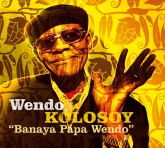
Antoine Wendo Kolosoy, known as Papa Wendo, was a Congolese musician. He is considered the "Father" of Congolese rumba, also known as soukous, a musical style blending son cubano, beguine, waltz, tango and cha-cha.
Henri Bowane (1926–1992) was an influential figure in the development of Congolese rumba in the modern-day Democratic Republic of Congo. He was the first professional boss and early mentor to the legendary guitarist Franco Luambo.
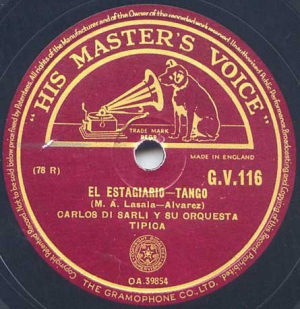
The G.V. Series were a series of 10 inch 78 rpm Gramophone records produced in Europe and the United States from 1933 to 1958, and exported to colonial Tropical Africa. They are credited with introducing Afro-Cuban music into modern African popular culture. The resulting re-interpretations influenced the creation of several genres of African popular music.

The first communities of the Greeks in the Democratic Republic of the Congo were established prior to Belgian colonization. The Greek presence reached a peak in the 1950s when many Greeks fled Egypt following the revolution of 1952. The Greek communities organized their own schools and churches and Greeks were active in trade, fishing, transport, coffee growing and the music industry. Also, a small group of Greek Jews emigrated to the Congo in the early 20th Century.
Dust-to-Digital is a record company that specializes in documenting the history of American popular music, including historical recordings of blues, gospel, and country music. Their method combines rare recordings with historic images, photographs, and detailed texts describing artists and their works. The company has won a Grammy Award and a Living Blues award.
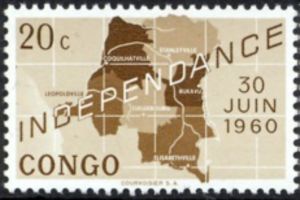
"Indépendance Cha Cha" was a song performed by Joseph Kabasele from the group L'African Jazz in the popular African Rumba style. The song has been described as "Kabasele's most memorable song" and one of the first Pan-African hits.

"Table Ronde" was a successful song written by Joseph Kabasele in the popular Congolese rumba style and performed by his band L'African Jazz. It was written for the Round Table Conference on Congolese independence held in Brussels, Belgium in 1960 which gave the song its name.
Paul Mwanga (1932–2016) was a vocalist and composer. He was one of the early pioneers of Congolese rumba. He was born in Angola.
Lucie Eyenga was a vocalist, and one of the early pioneers of soukous music. She was born in Bandaka in the Belgian Congo.
Editions Esengo was a record studio in the Congo, which is noted for assembling to their label Rock-a-Mambo, African Jazz, and Conga Jazz, three of the great powerhouse bands of Congolese rumba. Esengo is taken from the Lingala language, and is the word for "happiness" or "joy."
Zacharie Elenga was a virtuoso guitarist and one of the founding fathers of modern Congolese music. His unique style of playing led him to be popularly known as Jhimmy the Hawaiian, or simply Jhimmy.
African Jazz Mokili Mobimba was a popular song written in the Congolese rumba style by Mwamba Mongala and performed by Joseph Kabasele's band, African Jazz.
References
- ↑ "A brief history of Opika on ExcavatedShellac". 27 April 2008.
- ↑ "A brief history of Opika on ExcavatedShellac". 27 April 2008.
- ↑ Nzonga, Jean-Pierre François Nimy (2010). Dictionnaire des immortels de la musique congolaise modern. ACADEMIA. p. 99. ISBN 978-2872099771.
- ↑ "Early history at Opika by WorldService blog". 7 October 2008.